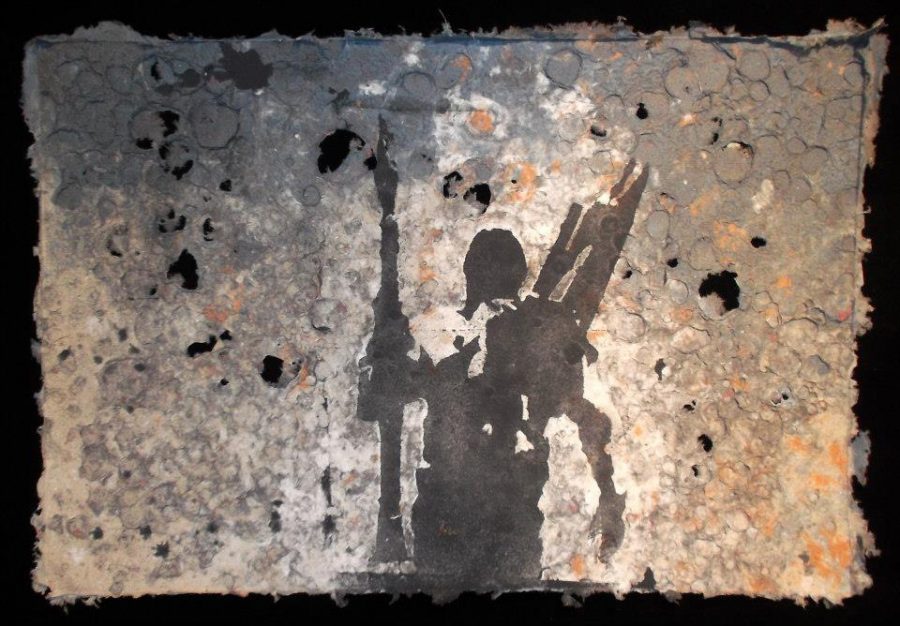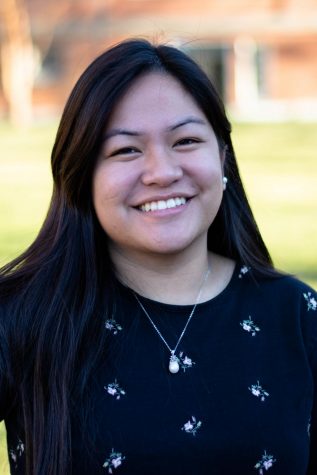Papermaking project helps students tell their stories
Creating art from old clothing can help to heal, project director says
“Benghazi” by Drew Matott, which reflects on violent revolutions around the world such as the London riots in 2011. The piece is made from military uniforms, Egyptian cotton and refugee clothing.
October 18, 2018
Peace Paper Project will host papermaking workshops at WSU Tri-Cities to encourage students and community members to engage in a hands-on activity, which involves old pieces of fabric that holds significance to one’s life.
The Peace Paper Project is an international organization of hand papermakers, art therapists and social activists, said Drew Matott, director of the Peace Paper Project. There are 40 studios dispersed around the world, including places such as Australia and Germany.
“Because of the universal nature of hand papermaking,” Matott said, “we’re able to address specific issues that are different in these areas.”
Matott’s first exposure with papermaking was during his undergraduate studies in printmaking at Buffalo State College, he said. Papermaking was a mandatory course he could not avoid.
“When I was told I had to take papermaking, I thought ‘I should probably change my major,’ ” he said.
But over time, Matott built a personal connection with the papermaking process, he said. The first connection he made was the fact that he could take his personal clothing and transform it into something more meaningful.
“If I was making a piece about American militarism,” he said, “I [would transform] military uniforms that I bought at the thrift store into paper.”
The papermaking process starts with choosing a textile the person wants to transform. The material is then cut into postage stamp-sized squares and place it in a Hollander beater, which grinds the squares, separates the fiber and hydrates them to, turning the mixture into paper pulp.
That mix is then scooped into a frame with a screen attached, where the drying paper takes shape.
“As a printmaker, if you’re screen printing, doing a litograph or etching, you use different papers and you treat the paper differently,” he said.
His father’s death, on the other hand, was the second connection that made him value the art of papermaking.
“I was going through my father’s old stuff, [and] at the bottom of this cardboard box was some of his old clothing,” Matott said. “I took that out and I said, ‘What would it be like to transform his old materials into paper?’ ”
He brought his brothers, sister and mother together and sat around the dining room table. As a family, they cut his father’s old clothing to turn into paper.
He printed photographs of his father’s life and travels, as well as his poems and architectural drawings onto the paper, he said. Afterwards, he bound the items into a book and distributed it to his family.
“It was a project and an experience that made me realize that papermaking — or paper itself — was something more than a surface that we print on,” Matott said. “It was actually something that can change people’s lives and tell a much more intimate story.”
Eventually, Matott started his own papermaking studio when he left Buffalo, New York.
“Transforming my father’s clothing into paper and then into a book is what has brought me to where I am today,” he said. “That was the big catalyst.”
Starting Monday, WSU Tri-Cities students will have the chance to try their hand at papermaking in a class from from 9 a.m. to 7 p.m., which will run until Thursday in the Student Union Building.
Papermaking has already been used for similar projects internationally. In Germany, one studio works with refugees who bring in clothes they wore as they fled their home country.
“[They] use that paper as a way to document their story [and] the story of their journey,” Matott said. “As they integrate into German and European culture, they have something to remember their home county [by].”
Papermaking allows people to engage in storytelling and art-making, he said. It was the Peace Paper Project’s first time at WSU, but the group visited WSU Vancouver before the Tri-Cities campus. In Vancouver, there were over 200 students who participated.
Matott said they worked with the Tri-Cities’ veteran students Monday and helped them showcase their story about their time in the service, whether they were deployed or not. Having the veterans craft their past experiences is a way for others to understand what they went through, he said.
“It’s a way for us to let the veterans know we got their back when they come home,” Matott said.











